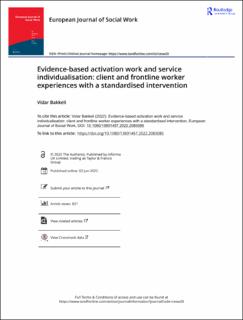| dc.contributor.author | Bakkeli, Vidar | |
| dc.coverage.spatial | Norway | en_US |
| dc.date.accessioned | 2022-09-23T13:51:49Z | |
| dc.date.available | 2022-09-23T13:51:49Z | |
| dc.date.created | 2022-09-09T11:10:47Z | |
| dc.date.issued | 2022-06-02 | |
| dc.identifier.citation | European Journal of Social Work. 2022, . | en_US |
| dc.identifier.issn | 1369-1457 | |
| dc.identifier.issn | 1468-2664 | |
| dc.identifier.uri | https://hdl.handle.net/11250/3020959 | |
| dc.description.abstract | Evidence-based interventions standardise frontline social services, but may also promote policy ideals like service individualisation and client involvement. This article examines how clients and frontline workers experience activities within an evidence-based intervention known as Individual Placement and Support (IPS) in the Norwegian Labour and Welfare Administration. The article draws on interviews and fieldwork conducted in one frontline office from 2017 to 2019. The findings show how clients developed relationships with frontline workers, were given time to follow individual trajectories and received tailored support when facing challenges. Intervention activities were characterised by flexibility, a relational approach to clients and detachment from normal organisational procedures. The findings illustrate how evidence-based interventions can enable service individualisation in frontline organisations, but also indicate a need for additional professional resources due to the complexity of the work. | en_US |
| dc.description.abstract | Evidensbaserte intervensjoner standardiserer sosiale tjenester, men kan også fremme idealer som tjenesteindividualisering og involvering av brukere. Denne artikkelen undersøker hvordan brukere og aktiveringsarbeidere opplevde aktiviteter innenfor en evidensbasert intervensjon kalt Individual Placement and Support (IPS) i ett NAV-kontor. Artikkelen er basert på intervjuer og feltarbeid fra 2017-2019. Funnene viser hvordan brukere utviklet relasjoner med aktiveringsarbeiderne, fikk tid til egen utvikling, og mottok tilpasset støtte når de møtte utfordringer. Intervensjonsaktiviteter var fleksible, relasjonelle og avkoblet fra vanlige prosedyrer i organisasjonen. Funnene illustrerer hvordan evidensbaserte intervensjoner kan muliggjøre tjenesteindividualisering i førstelinjeorganisasjoner, men indikerer også et behov for profesjonelle ressurser på grunn av kompleksiteten i arbeidet. | en_US |
| dc.description.sponsorship | The study was financed by the project “Front line innovations in the welfare services” (INNOWEL), funded by the Research Council of Norway (project no. 256706). | en_US |
| dc.language.iso | eng | en_US |
| dc.publisher | Routledge | en_US |
| dc.relation.ispartofseries | European Journal of Social Work; | |
| dc.rights | Attribution-NonCommercial-NoDerivatives 4.0 Internasjonal | * |
| dc.rights.uri | http://creativecommons.org/licenses/by-nc-nd/4.0/deed.no | * |
| dc.subject | Supported employment | en_US |
| dc.subject | Standardisation | en_US |
| dc.subject | Personalisation | en_US |
| dc.subject | Employment | en_US |
| dc.subject | Individual placement | en_US |
| dc.subject | Individual support | en_US |
| dc.subject | Supported employment | en_US |
| dc.subject | Standardisering | en_US |
| dc.subject | Personalisering | en_US |
| dc.subject | Aktiveringstjenester | en_US |
| dc.subject | Individuell jobbstøtte | en_US |
| dc.title | Evidence-based activation work and service individualisation: client and frontline worker experiences with a standardised intervention | en_US |
| dc.title.alternative | Evidensbasert aktiveringsarbeid og tjenesteindividualisering: Brukere og aktiveringsarbeideres erfaringer med en standardisert intervensjon | en_US |
| dc.type | Peer reviewed | en_US |
| dc.type | Journal article | en_US |
| dc.description.version | publishedVersion | en_US |
| dc.rights.holder | © 2022 The Author(s) | en_US |
| cristin.ispublished | true | |
| cristin.fulltext | original | |
| cristin.qualitycode | 2 | |
| dc.identifier.doi | https://doi.org/10.1080/13691457.2022.2083085 | |
| dc.identifier.cristin | 2050254 | |
| dc.source.journal | European Journal of Social Work | en_US |
| dc.source.pagenumber | 1-13 | en_US |
| dc.relation.project | Norges forskningsråd: 256706 | en_US |

